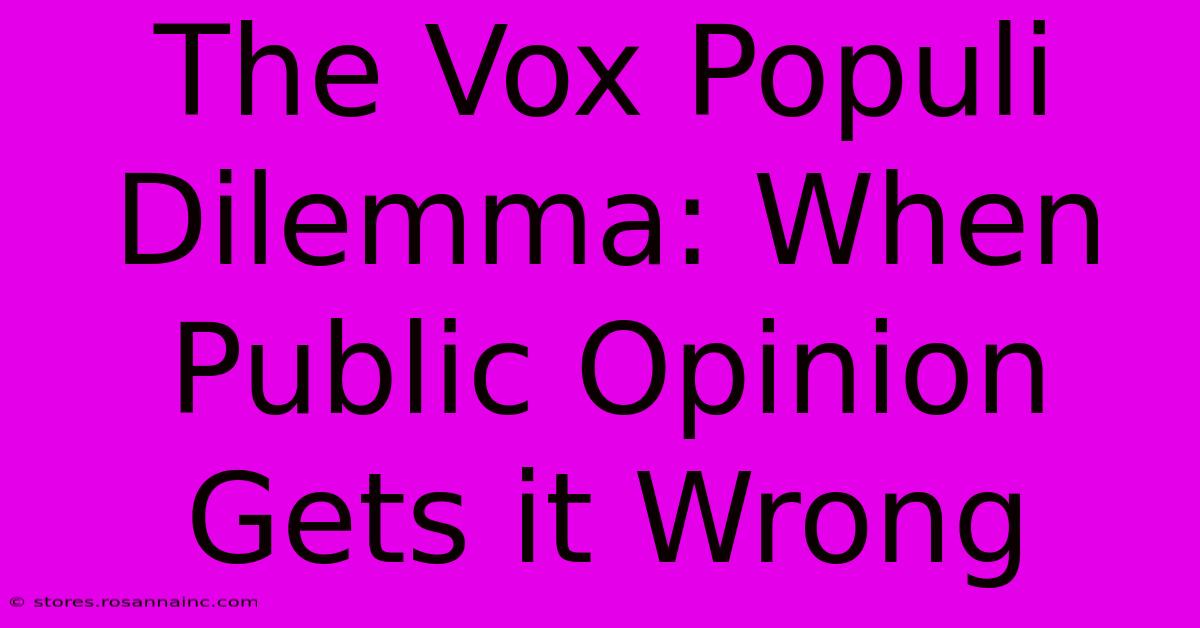The Vox Populi Dilemma: When Public Opinion Gets It Wrong

Table of Contents
The Vox Populi Dilemma: When Public Opinion Gets it Wrong
The phrase "vox populi, vox Dei" – the voice of the people is the voice of God – suggests a powerful connection between public opinion and truth. But history is replete with examples where the populace has been spectacularly wrong, highlighting a crucial dilemma: when should we trust the collective wisdom of the crowd, and when should we acknowledge its fallibility? This article explores the complexities of this dilemma, examining the factors that can lead public opinion astray and considering the implications for democracy and decision-making.
The Allure of the Crowd: Why We Trust Public Opinion
The belief in the wisdom of crowds stems from several compelling factors. Firstly, the sheer number of individuals involved suggests a statistical advantage. With many opinions contributing, it's reasoned that individual biases and errors should cancel each other out, leaving a relatively accurate collective judgment. This is the principle behind prediction markets and certain forms of polling.
Secondly, there's a strong social element. Public opinion often reflects shared cultural values, norms, and experiences. This shared understanding can be valuable, especially in shaping policy related to social issues. We tend to trust the collective judgment of our peers, assuming that widespread agreement points towards a valid conclusion.
Finally, democratic principles emphasize the importance of public opinion. Governments are, ideally, expected to represent the will of the people. Ignoring public sentiment risks undermining legitimacy and potentially leading to social unrest.
When the Crowd Gets it Wrong: Biases and Manipulation
Despite its allure, public opinion is far from infallible. Several factors can significantly distort collective judgment:
1. Information Cascades:
This occurs when individuals adopt beliefs based on the observed actions of others, rather than on their own independent assessment of evidence. This can lead to a snowball effect, where an initially incorrect belief spreads rapidly throughout the population. Think of viral misinformation on social media.
2. Confirmation Bias:
People tend to seek out and interpret information that confirms their pre-existing beliefs, while ignoring contradictory evidence. This can strengthen existing biases within a population, leading to a distorted collective viewpoint.
3. Groupthink:
Within homogenous groups, a desire for harmony can stifle dissent and critical thinking. This can lead groups – and by extension, public opinion – to make poor decisions, prioritizing consensus over accurate assessment.
4. Propaganda and Misinformation:
Deliberate manipulation of information, through propaganda or the spread of false narratives, can significantly sway public opinion. Sophisticated campaigns can exploit cognitive biases and emotional vulnerabilities to achieve desired outcomes. The impact of "fake news" is a prime example.
5. The Role of Elites and Influencers:
Public opinion is not formed in a vacuum. Powerful individuals and groups, including politicians, media outlets, and celebrities, can exert significant influence over the public discourse and shape perceptions. This can lead to a situation where public opinion reflects the agenda of specific elites, rather than a genuine consensus.
Navigating the Dilemma: Critical Evaluation and Informed Citizenship
The challenge, therefore, lies in discerning when to trust public opinion and when to question it. A critical approach is essential. This involves:
- Evaluating the source of information: Be wary of biased sources and actively seek out diverse perspectives.
- Scrutinizing claims: Don't accept information at face value. Question the evidence presented and look for independent verification.
- Understanding cognitive biases: Recognize your own biases and those that may be influencing others.
- Promoting media literacy: Develop the skills to identify misinformation and propaganda.
- Encouraging critical discourse: Create spaces for open and respectful debate, where different viewpoints can be aired and examined.
Ultimately, the "vox populi" dilemma underscores the importance of informed and engaged citizenship. A healthy democracy requires individuals capable of critical thinking, media literacy, and a willingness to challenge prevailing narratives. Only through careful analysis and reasoned deliberation can we navigate the complexities of public opinion and make sound collective decisions. Ignoring the potential pitfalls of relying solely on popular sentiment can lead to detrimental outcomes, highlighting the need for constant vigilance and critical evaluation.

Thank you for visiting our website wich cover about The Vox Populi Dilemma: When Public Opinion Gets It Wrong. We hope the information provided has been useful to you. Feel free to contact us if you have any questions or need further assistance. See you next time and dont miss to bookmark.
Featured Posts
-
Six Eyed Sand Spider Deadly Or Misunderstood
Feb 10, 2025
-
Super Bowl 2025 Jon Batiste Anthem Time
Feb 10, 2025
-
Beyond The Riddle Exploring The Impact Of A Falling Tree
Feb 10, 2025
-
Michael Jackson 2025 A Musical Journey For The Ages
Feb 10, 2025
-
Grand Prairie Tx County Hidden Gem Or Overlooked Oasis
Feb 10, 2025
